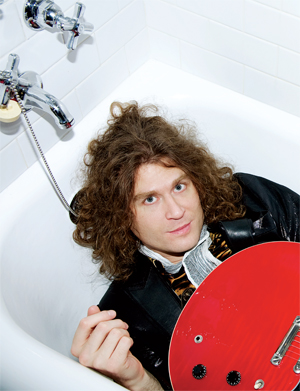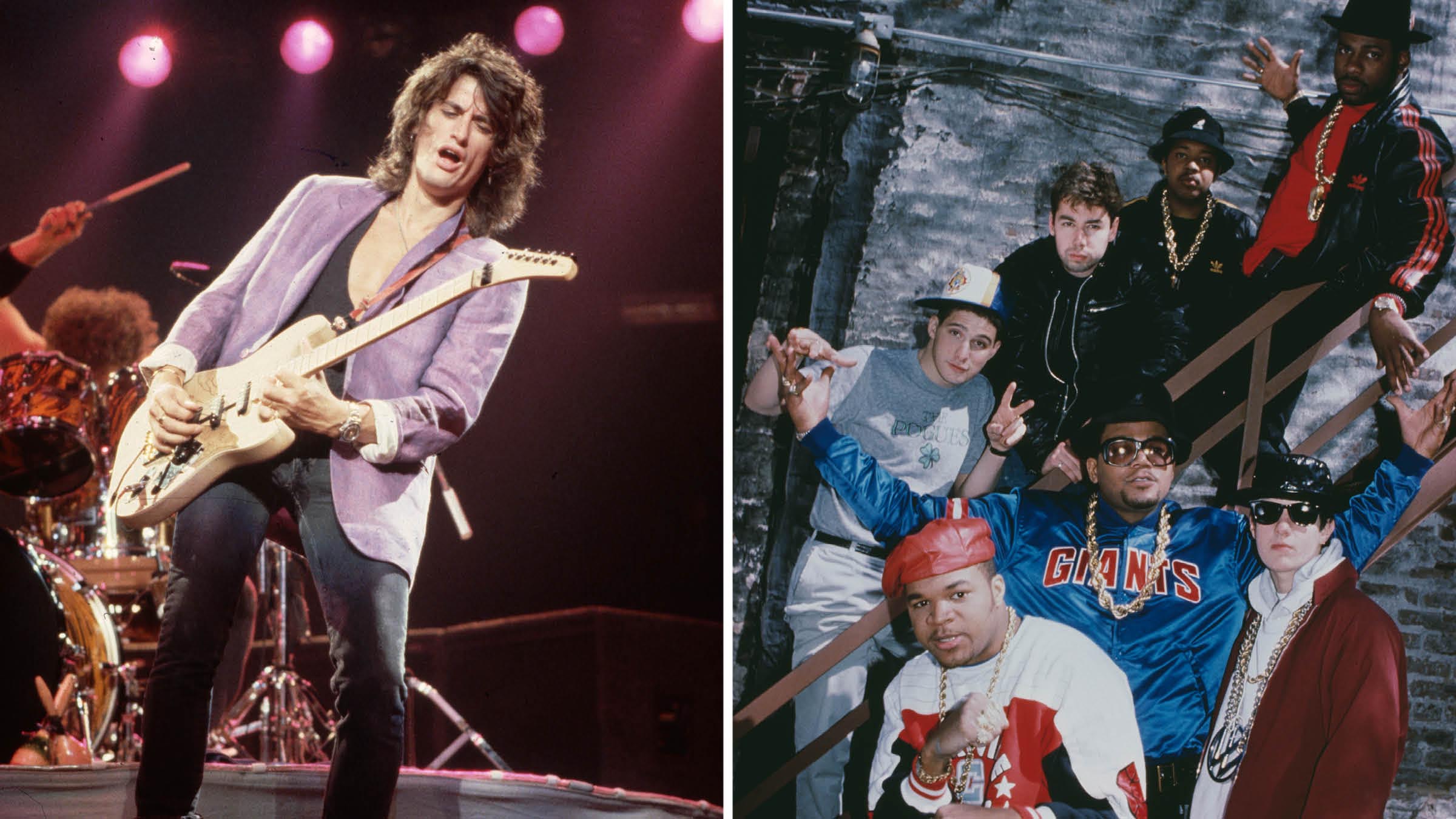The Killers: All Killer No Filler
All the latest guitar news, interviews, lessons, reviews, deals and more, direct to your inbox!
You are now subscribed
Your newsletter sign-up was successful

Originally published in Guitar World, February 2009
Dave Keuning tells how The Killers scored a knockout with their lean and mean new album, Day & Age.
Early success could have ruined the Killers. When they exploded on the music scene in 2004 with Hot Fuss, an irresistible razzle-dazzle update of new wave and post-punk, they seemed already fully formed, and danceable songs such as “Mr. Brightside,” “Jenny Was a Friend of Mine” and “Somebody Told Me” made the Las Vegas quartet shiny new stars.
“And then we almost blew it with Sam’s Town,” says guitarist Dave Keuning, referring to the band’s 2006 Bruce Springsteen–esque followup that had many scratching their heads, sort of the way Keuning is doing now, seated in New York’s Gramercy Park Hotel bar. He runs a hand through his generous, unruly mane of rock star hair and chuckles. “I’m joking, of course,” he says. “We love Sam’s Town, and we’ll never apologize for it. We’re not the kind of band that makes the same songs over and over again. If that’s what you want, go listen to somebody else.”
No apologies will be necessary once fans get a listen to Day & Age (Island), the Killers’ new record. Its 10 songs capture the emotional anxiety of the times with a startling directness while they deliver plenty of rocking, stomping beats to fill dance floors and melodies to fill your head. Throughout the record, Keuning sprinkles liberal doses of sonic sweetening that reflect his love of guitarists such as the Edge and Johnny Marr.
Surprisingly, those aren’t the guitarists he grew up on. As a teenager in Pella, Iowa, Keuning was spellbound by bands such as Deep Purple, Aerosmith and AC/DC. “To this day, Angus Young is my favorite guitarist,” he says. “He plays the guitar to the max, you know? But it’s funny: that’s just not me. My fingers just don’t move like that. Consequently, my mind doesn’t think like that when I’m playing with the Killers. I probably think more like the Edge; I think of sounds and moods more than I think of figures and patterns. And it seems to work for the Killers, so, you know, why mess with it?”
GUITAR WORLD You’re from Iowa. Not many bands come from there, except Slipknot. What made you decide on moving to Las Vegas to pursue your musical dreams? It’s not the usual choice.
All the latest guitar news, interviews, lessons, reviews, deals and more, direct to your inbox!
DAVE KEUNING I went to college in Iowa for a little bit and tried to get some bands together there. That was about a year of my life. The other guys moved away, and I dropped out of school. I worked for a while, and eventually I just said to myself, This can’t be it. This can’t be, you know, how it ends. [laughs] So I decided I had to get out.
I considered moving to New York or Los Angeles, but they’re two of the hardest places to move to when you’re just starting out in a band. I did some research and found that Vegas was, like, a third of the price. So I thought, Well, it’s close to Los Angeles, and it’s a pretty cool place. And I moved there. I found an apartment I could afford. It was pretty awful by most people’s standards, but I liked it. It served my needs.
GW You put an ad in a local paper and found Brandon Flowers?
KEUNING Well, first I found a girlfriend who I had a band with for a time. Moral to the story: don’t get involved with girls in your bands. [laughs] But after that, I ran another ad, and Brandon answered, and that’s when the Killers started falling into place.
GW Did you balk at following a new-wave, post-punk musical direction? As a guitarist, did you want to play in something heavier?
KEUNING No, not at all. I love heavy music, but you see, I had fallen in love with a radio station in Vegas that played nothing but Eighties music. That had a real profound impact on me. All the other stations were playing this… well, I hate to name names…
KEUNING You know, Creed and Limp Bizkit—these faux heavy bands and nu-metal–type things. I’m not trying to put them down, although I guess I am, but they weren’t my cup of tea. I liked groups that weren’t so…you know…
GW Simplistic?
KEUNING Yeah. Groups that didn’t just plod along on one idea throughout a song. When I started listening to the Eighties station, I got really into bands like the Smiths and the Cure and New Order.
So when Brandon and I hooked up, we were right on the same page. And so was everybody in the band. We knew we could make the kind of music we loved but make it tough sounding.
GW Were you surprised at the reaction to your first album, Hot Fuss? It exploded in the way that most bands would dream of.
KEUNING Not to sound conceited, but…no. I knew we were good, that we had great songs. I just thought, If only we’re given a chance, people will respond. And they did. I knew we were as good as any band on the radio, and here we are, on the radio!
GW Tell me about how you approached Day & Age. Did your writing or recording method differ from your other records?
KEUNING It was different. We worked more separately during the writing stages. After we had finished touring behind Sam’s Town, we took a break and went home and started writing by ourselves. We all started making demos and emailed them to each other using Logic [recording software], which is a great system to use.
GW What made you go with Stuart Price [Madonna, Missy Elliot] as your producer? He doesn’t seem like a “rock” kind of guy.
KEUNING Yeah, but he is, actually. He’s very, very musical. We just clicked. He had passion and great ideas. We had dinner with him in London, and we could just tell it was gonna work out. We went back to his apartment and I started playing him the intro to “Human,” and immediately he had an enthusiasm and ideas that seemed to fit.
GW There are a lot of ornamental touches that you do on the guitar throughout the record. Do you think people don’t see what you do sometimes?
KEUNING You mean, because I’m not a shredder?
GW Exactly.
KEUNING Probably, but that’s okay. I care about the songs, the band, the overall statement. [laughs] Although sometimes people think my guitar parts are keyboard parts. That does bother me sometimes.
GW The album is very emotional, and your playing reflects that. The solo on “Losing Touch” is very anthemic and soaring. What kind of guitar did you use on it?
KEUNING On “Losing Touch,” I think I used a Gibson ES-335.
GW I was wondering if you used your Fender Starcaster. That’s such a cool guitar.
KEUNING It is a cool guitar. I didn’t use that on much of the new album. I wound up using the 335 a lot. It just seemed to sound right.
GW When recording, generally how many passes do you do on a solo?
KEUNING Five or six, but not much more. After two or three tries I find an idea of where I should be going. With solos, if you think about them too much, they become sterile, they lose the life and the spark they should have. I always think solos should sound like the player is just playing, not like he’s performing this piece of music he’s written out.
